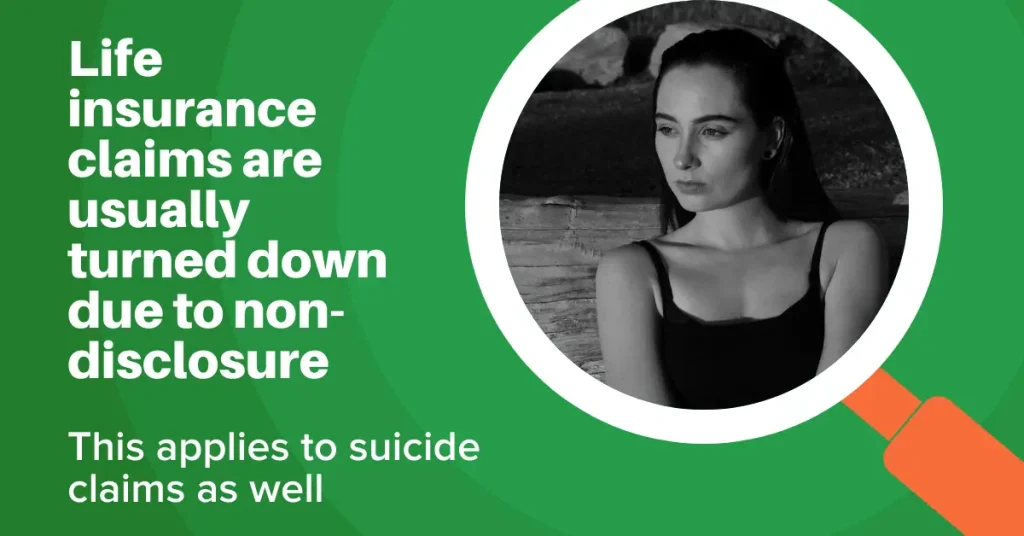Does Life Insurance Cover Suicide?

Suicide is one of the most common causes of death worldwide. In the UK alone, it has become a national issue, with an average of 18 suicides per day as of 2021.
With the current global situation, these numbers are unfortunately on the rise. More and more people struggle with mental health issues, often developing mental illnesses, such as depression, that may prompt them to have suicidal thoughts.
We are frequently asked whether life insurance covers suicide. There’s a belief that life insurance won’t pay out for suicide.
It’s a common misconception, but it also doesn’t mean that beneficiaries will receive the payout in every case of suicidal death. Life insurance policies contain specific clauses determining whether a payout can be issued.
Read on to find out when life insurance covers suicide and when it won’t be possible.
Mental Health Issues and Life Insurance Claims
Having mental health issues such as bipolar disorder won’t prevent you from taking out a life insurance policy. However, having a documented history of mental illness or previous suicide attempts may impact how your premiums are calculated.
Also, such a policy can be considered higher risk.
You may be offered standard premium rates if you have mild mental health problems (such as mild depression, anxiety, or stress).
On the other hand, your premiums might be high at first, but providing your insurer with proof of treatment might cause them to decrease over time.
Nevertheless, you must be honest throughout the application process and provide your insurer with valid information regarding your physical and mental well-being. Also, remember that your insurer can ask your GP for such information.
Life Insurance Policy After Suicide
While taking out a life insurance policy can be challenging for a person who previously attempted suicide, it’s not impossible. However, their application will be subjected to a manual underwriting process.
During this time, insurance companies will request information regarding the attempt at suicide, such as when it happened, whether it was the first instance, and if the potential policyholder undergoes any treatment.
Recollection of such events in this setting may be triggering for some people, yet it’s also a process that can’t be skipped.
This information will be used to calculate monthly premiums based on the level of risk the insurer believes a person might pose.
However, as mentioned earlier, the rates might change if the risk is deemed low or if the insurer receives proof of ongoing treatment and the mild nature of their mental health struggles.

How Suicide Clauses Work
Taking out life insurance cover might prompt some people who are already struggling with their mental health to develop suicidal thoughts.
However, insurance companies want to prevent people from having a financial incentive to take their own lives. As a result, their life insurance policies might include a suicide clause (also known as suicide provisions).
A suicide clause specifies a period of time during which the insurer won’t issue a payout if the policyholder dies by suicide.
This is known as the exclusion period, which usually lasts one to two years after taking out a life insurance policy. Only after that date can beneficiaries receive the payout from their loved one’s life insurance policy.
Keep in mind, though, that the exclusion period can be reset. It will start over if the policyholder changes their policy, such as converting their term policy to a whole life policy or opting for additional coverage (e.g., critical illness or terminal illness coverage).
The Contestability Clause
The contestability clause, or contestability period, refers to the time an insurer has to investigate a policyholder’s death before issuing a payout to their beneficiaries. It usually runs for the same length as the suicide clause.
However, it differs from a suicide provision because the latter refers solely to a death caused by the policyholder. On the other hand, the contestability clause applies to any death that occurs within the period stated in the policy.
The insurer can use autopsy reports, medical reports, specialist referrals, NHS and private hospital admissions, and interviews with the deceased person’s family or friends.
For example, suppose the cause of death of the policyholder is cancer. In that case, the insurer can review the policyholder’s medical history and autopsy reports to determine whether or not the policyholder suffered from substance abuse or was a smoker.
The insurer can decline the payout if it deems this to be the case, and it wasn’t disclosed during the application process.

Life Insurance and Drug Overdose
Any use of illegal drugs is considered risky behaviour in terms of life insurance.
If your loved one passes away due to a drug overdose, three aspects are taken into account before the payout can be made:
- Type of drug overdose (accidental or intentional)
- Type of drug
- Honesty about previous drug use
Here’s how the situation looks for intentional and accidental drug overdose deaths:
Intentional Drug Overdose
Intentional drug overdose happens when a policyholder passes away due to the excessive consumption of illegally obtained drugs (including prescription drugs).
It falls under the suicide clause, which means that the payout won’t be issued if the overdose occurred within the first year or two of the policy (the time depends on the conditions proposed by the insurer).
Additionally, the payout will be denied if the policyholder lied about their drug use during the application process for their life insurance coverage.
Accidental Drug Overdose
An accidental drug overdose falls under the contestability clause, meaning that the insurer has the right to investigate the cause of death during the first two years of the policy.
If the death of your loved one was a result of an overdose of lawfully prescribed drugs, it’s more likely to be deemed unintentional, and the payout can be made.
However, the payout may be denied if the investigation proves that the policyholder was dishonest about their drug use.
This is why it’s so important to be honest during the application process. If the insurer finds out the policyholder lied about their drug habit, it can deem their policy invalid.
Moreover, if their dishonesty is discovered before their death, it may constitute insurance fraud. As a result, the policyholder might have to pay hefty fines or even face jail time.
Does Life Insurance Cover Suicide?
The answer to this question is – it depends. Suppose a policyholder commits suicide while the exclusion period is still in place, for example, within the first year of taking out their life insurance policy. In that case, their life insurance will not cover it.
If the policyholder passes away due to suicide after the exclusion period ends, their beneficiaries may be eligible to receive the payout. Still, their insurance company must assess their claims, just as it would in other cases.
How Does an Insurance Company Know If Someone Died by Suicide?
Beneficiaries must file a claim when the policyholder dies to receive a payout from the policy.
The insurance company will ask them to submit a death certificate, where the cause of death is always indicated. When a policyholder commits suicide, this fact is put on record, and the insurer can review it upon requesting the policyholder’s death certificate.
Sometimes, the death certificate is inconclusive or includes a questionable cause of death. If that’s the case, the insurance company may require additional documentation, such as an autopsy report, a medical examiner report, an EMS report, or the person’s medical records.
It is also worth noting that deaths by suicide can take longer to investigate. As a result, beneficiaries may experience a delay in receiving benefits under the policyholder’s life cover.
Even though this process can be more time-consuming, more complex, and emotionally draining, beneficiaries shouldn’t be deterred from filing a claim – the payout can help them get through this difficult time and provide them with some peace of mind.
Making a Claim After a Suicide Death
If you happen to lose your loved one to suicide, there are several things you can do as you make your claim.
First, review the terms of their life insurance policy. If your loved one committed suicide during the duration of the suicide clause, you’re very unlikely to receive the payout.
Then, you should contact the insurer even if the event happened while the suicide provision was still in place – some companies offer a payback of already paid premiums.
Finally, consider reaching out to a specialist. Below, you’ll find the numbers and email addresses of organisations that can offer you advice during this difficult time or can simply give you a safe space to talk.
Where to Get Help
Getting help is often the first step to recovery. Below, you’ll find several contact details of organisations that may help you deal with mental health issues or grief.
- Samaritans – Call: 0116 123 or email: jo@samaritans.org
- Papyrus (for under 35) – Call: 0800 068 4141 or email: pat@papyrus-uk.org
- The Silver Line (for older people) – Call: 0800 470 8090
If you lost your loved one due to suicide and you’re dealing with grief, you can also reach out to:
- Cruse Bereavement Care – 0844 477 9400 (a list of services can be found on their website).
Why Use Insurance Hero?
Give yourself and your loved ones peace of mind with the right life insurance policy. Insurance Hero is ready to assist you every step of the way. Contact us today to learn more about life insurance policies.
We’ll help you pick the best offer and answer any questions you might have!
Steve Case is a seasoned professional in the UK financial services and insurance industry, with over twenty years of experience. At Insurance Hero, Steve is known for his ability to simplify complex insurance topics, making them accessible to a broad audience. His focus on clear, practical advice and customer service excellence has established him as a respected leader in the field.



